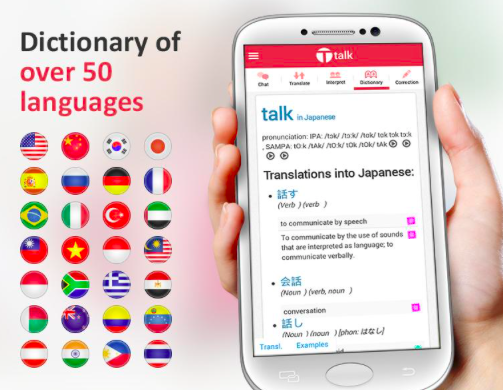Simultaneous translation apps English to Brazilian Portuguese; advantages and disadvantages (pros and cons)
Simultaneous translation apps English to Brazilian Portuguese, advantages and disadvantages ; we live in the era of mobile apps. There is an app for everything; from banking systems where you can check your bank account statements and transfer cash, apps to purchase at virtual stores, for social networks, apps for taxis and delivery of goods and even apps for simultaneous translation, can you believe it? Learn about using simultaneous translation apps from English to Brazilian Portuguese or other languages
The usage of apps for simultaneous or consecutive translation has advantages and disadvantages according to your needs and according to how you are going to use it. Do not think that translation apps are a good alternative for all occasions. You will understand this better after you read our article below.
-

Simultaneous translation apps English to Brazilian Portuguese
Cases where translation apps are not recommended
In order to save money or perhaps trying to be practical, which does not always turn out this way, some event planners think of using apps for simultaneous translation, apps that may end up compromising the quality and efficiency of the translation process in real time. This is definitely not a good option.
Apps that do simultaneous translation do not have what we call deep or emotional intelligence; an app will never understand a joke, a double meaning or synonymous words. For example, a chip may be a mobile phone chip or a French fry, in English. If you order a chip, the app will never know if you want a new chip for your cell phone or if you want to eat French fries!
Although it has improved greatly over the years, there is still no real guarantee of accuracy. For example, if you need to visit a doctor when you are on vacation with a sore throat and use Google Translate to list your symptoms, he may end up suggesting medications that are totally different from the ones you need.
The list of misunderstandings that can occur is immense and we could write a 500-page article on this subject. Insert the lyrics of the famous song The Girl from Ipanema into Google translate from Portuguese into the English language and pay close attention to the disaster that takes place …… you will have a good laugh. It has nothing to do with what the lyrics say in Portuguese !
In general, technology serves to improve our lives. Softwares can automate steps, reducing the human workload. However, translation, like most language-related tasks, is complex. The machines have not yet reached the point where they can use a language the way people use it. Translation is at least twice as complex as just writing in one language, and has several deep layers.
Simultaneous translation apps are likely to improve the precision of translations as their database grows, but the context and individual subtleties will be hard to come by. A machine has no sense of humor and cannot find the perfect words for many texts.
Not to mention different accents; many countries have English as their official language and others, Portuguese. Imagine an Indian, a South African, a Scotsman, an Australian, an Englishman and an American. They all speak English as their native language. And we also have to consider people from countries where English or Portuguese are not native languages, where people learn one of these languages: what about a Chinese trying to speak halting English and an app trying to understand what is being said? Or an American who has learned Portuguese and decides give his lecture in Portuguese? Will the app be able to understand and do the simultaneous translation of the Portuguese of this American, speaking with a heavy accent, into English? Never !
Brazil, Portugal, Angola, Mozambique, Cape Verde, Timor, among others, all have Portuguese as their official language; each with a completely different accent, not to mention the different accents, dialects and expressions within the same country!
Avoid using translation apps at business meetings in Brazil
Simultaneous translation apps English to Brazilian Portuguese, pros and cons
Imagine a business meeting in Brazil with several participants. No matter the nationality and the spoken languages, we know that in most cases, the apps make huge mistakes, inconsistencies and even verbal conjugation errors. This can be very embarrassing, It does not matter if the meeting is in-house, out of the office, or during a trip. The more important a meeting is, the less recommended it is to use any type of translation app.
In such cases, to ensure clarity in translation, always opt for a qualified interpreter.
Have we talked about the human factor? The presence of an interpreter guarantees not only the quality of the translation, but the gestures, voice, enthusiasm and emphasis; the human presence creates an incomparable dynamism in an event or meeting.
Do not use for important events and congresses in Brazil
For situations with informal conversations between people of different nationalities, translation apps are great and make communication much easier.
During important presentations, translation apps will never offer the necessary precision and quality in translation, causing highly compromising situations.
Remote interpretation services Brazil
Simultaneous Translation Brazil
Cases where translation apps can be useful in Brazil
When traveling as a tourist in Brazil
It seems obvious, but in cases where you need short or basic travel dialogues, translation apps may be suitable and meet the needs of the traveler. They can also be useful for essential conversations in coffee shops, at the hotel reception and in markets in Brazil. The best app for personal and short dialogs is Google Translate. However, the traveler needs to be connected to the internet and this is not so simple in all places. Not everyone sells chips for cell phones for short visits.
The same app can now also translate images. Just point the camera at a traffic sign, for example, and the app will translate the content written on the board.
All apps for consecutive or simultaneous translation are constantly being developed and evolving but at events they will never replace a human interpreter; fortunately, machines will never completely replace men.
If you are searching for english to Brazil translation, we are the solution.






Leave A Comment